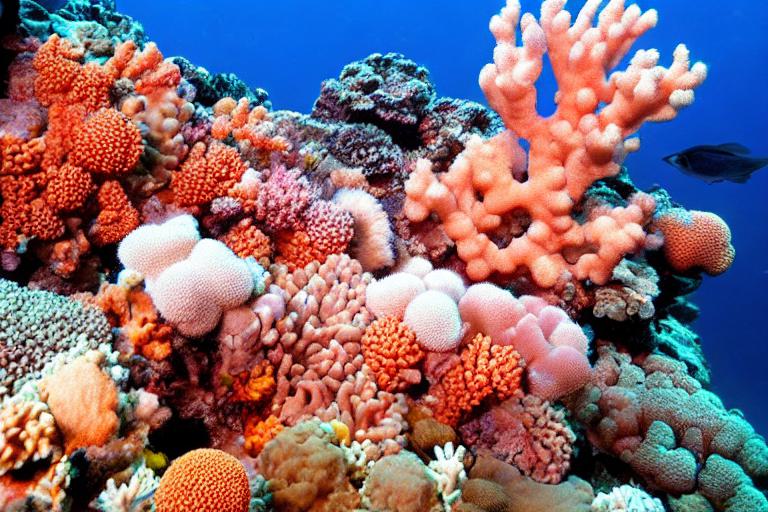Soft corals are a type of coral that is not attached to the ocean floor. Instead, they are anchored by a small, finger-like structure called a holdfast. Soft corals are found in all the world’s oceans and come in a wide variety of colors, shapes, and sizes. Many soft corals are filter feeders, meaning they capture small particles of food from the water column.
Soft corals are a beautiful and popular addition to many saltwater aquariums. However, they can be difficult to keep alive in captivity. This is because soft corals are very sensitive to changes in water quality and need to be kept in a well-established aquarium with stable water parameters.
Here are a few tips to help you keep your soft corals healthy:
1. Choose the right species for your aquarium.
Some soft corals are more difficult to care for than others. Do your research to make sure you are choosing a species that is compatible with your tank size, water parameters, and lighting.
2. Provide adequate lighting.
Soft corals need bright lighting to thrive. Most aquarium lights will not provide enough light for soft corals, so you will likely need to supplement with additional lighting such as metal halide or T5 fluorescent bulbs.
3. Keep up with water changes.
Water quality is extremely important for soft corals. Be sure to do regular water changes and monitor your water parameters closely.
4. Feed your corals.
Many soft corals are filter feeders and need to be fed small particles of food. You can purchase commercial coral food or make your own by blending seafood or fish food in a blender.
By following these tips, you can successfully keep soft corals in your aquarium and enjoy their beauty for years to come.
What are soft corals: a quick guide
Soft corals are a type of coral that are soft to the touch. They are often brightly colored and have a wide variety of shapes and sizes. Soft corals do not have a hard skeleton like other types of corals. Instead, they have a soft, fleshy body that is supported by a network of tiny calcium carbonate spines.
They are a popular type of coral for home aquariums because of their bright colors and interesting shapes. Soft corals are relatively easy to care for, but there are a few things to keep in mind to ensure they stay healthy. Soft corals are found in tropical and subtropical waters all over the world.
It is important to research the specific needs of the type of soft coral you are keeping before adding it to your aquarium. They also need to be fed regularly with small pieces of food. Soft corals need good water quality and plenty of light.
With proper care, soft corals can be a beautiful and rewarding addition to your aquarium.

Soft coral classification
They get their name from their soft, fleshy bodies, which are made up of a type of protein called collagen. Soft corals are often brightly colored, and their branches can be either stiff or flexible. Soft corals are a type of coral that are typically found in shallower, warmer waters.
Leather soft corals are usually more colorful than stony soft corals. Stony soft corals have a hard, calcium-carbonate skeleton, while leather soft corals do not. There are two main types of soft coral: stony and leather.
They also get some of their nutrients from the symbiotic algae that live in their tissues. Soft corals are filter feeders, meaning they capture small particles of food from the water using their tentacles.
They provide habitat and food for many different types of animals, and their beautiful colors add to the beauty of the underwater world. Soft corals are not as well-known as hard corals, but they play an important role in the marine ecosystem.
Tips to keep soft coral healthy
They also need to be in water with a stable temperature and a moderate amount of salt. Lastly, it’s important to keep them away from any potential sources of pollution. There are a few things to keep in mind when it comes to keeping soft coral healthy. First, they need a lot of light.
Here are a few tips to keep in mind when it comes to keeping your soft coral healthy:
Make sure they have plenty of light. They need at least 4-5 hours of direct light per day. 1.
Keep them in water with a stable temperature. 2. Soft coral can’t tolerate large swings in temperature, so it’s important to keep them in an aquarium or fish tank that has a consistent temperature.
3. Keep the salt content moderate. Too much salt can be harmful to soft coral, so it’s important to keep the salt content in their water at a moderate level.
Keep them away from potential sources of pollution. This includes things like chemicals, pollutants, and other toxins. 4.
Water quality
Water quality is one of the most important factors in keeping soft corals healthy. Most soft corals are sensitive to changes in water quality, and even small changes can cause them to become stressed or sick.
To maintain good water quality for your soft corals, it is important to do regular water changes and to use a high-quality salt mix. It is also important to test your water regularly for ammonia, nitrites, and nitrates. If you notice any changes in your coral’s appearance or behavior, it is important to test the water and make any necessary changes to improve water quality.
Light
The light should be in the blue spectrum, and it should be able to penetrate the water column to reach the coral. Lighting is one of the most important factors in keeping soft corals healthy. They need a moderate to high level of light, and the light should be fairly intense.
The water should be clean and free of pollutants. Soft corals also need a good water flow to keep them healthy. The flow should be moderate to strong, and it should be directed towards the coral.
They can also be fed with frozen food, such as plankton or krill. They can be fed with live food, such as brine shrimp or mysis shrimp. Finally, soft corals need to be fed.
Feeding
But in captivity, it’s up to you to make sure they’re getting everything they need. As with most animals, what you feed your soft corals will have a direct impact on their health. In the wild, soft corals get the majority of their nutrients from the water around them.
First, they need a lot of food. So, if you’re going to be changing their food or the water they’re in, do it slowly and carefully. Second, they’re very sensitive to changes in water quality. They’re constantly growing and expanding, so they need a constant supply of nutrients. There are a few things to keep in mind when feeding your soft corals.
Finally, don’t overfeed them. But if you overfeed them, they can start to suffocate and die. It’s easy to do, since they’re always hungry. So, only give them as much food as they can eat in a few minutes.
If you follow these tips, your soft corals will stay healthy and happy for years to come.
Protection
While soft corals don’t have a hard exoskeleton like stony corals, they do have a calcium-carbonate skeleton just below their tissue. This mucus layer is important because it provides protection from predators, parasites, and disease. This skeleton is what gives them their shape and support. In addition to their skeleton, soft corals have a mucus layer that covers their tissue.
Finally, be sure to provide them with plenty of food and nutrients. There are a few things you can do to help protect your soft corals. A healthy coral is a happy coral! Second, don’t place them too close to other corals or objects in the aquarium. This can damage their mucus layer and make them more susceptible to disease. First, make sure they are kept in a clean aquarium with good water quality.
Comparing soft and hard coral
Soft coral does not form reefs, but it is still an important part of the coral ecosystem. Hard coral is the type that most people think of when they think of coral. There are two types of coral: soft and hard. It is the type that forms the large reefs.
Hard coral is made up of a hard skeleton. This skeleton is made up of calcium carbonate. Soft coral does not have a hard skeleton. Instead, it has a soft, spongy body.
Hard coral also needs to be attached to a hard surface. Hard coral is more difficult to keep alive in an aquarium than soft coral. This is because hard coral needs more light and more stable water conditions. Soft coral does not need to be attached to a hard surface and can live in a wider range of water conditions.
If you are interested in keeping coral in your aquarium, you should research both types of coral to see which one would be best for your aquarium.
Frequently Asked Questions
1. What are soft corals?
Soft corals are a type of coral that is composed of a soft, rubbery material. These corals do not have a hard exoskeleton like stony corals. Instead, they have a flexible skeleton made of a protein called gorgonin. Soft corals are found in a wide range of colors, shapes, and sizes.
2. Where do soft corals live?
Soft corals are found in tropical and subtropical waters around the world. They typically live in shallow reefs and lagoons.
3. What do soft corals eat?
Soft corals get their nutrients from a variety of sources. They can absorb nutrients from the water column. They also get nutrients from the algae that live on their surface. Lastly, they can capture small prey items with their tentacles.
4. How do soft corals reproduce?
Soft corals can reproduce both sexually and asexually. Asexual reproduction occurs when the coral fragments. Sexual reproduction occurs when the coral releases eggs and sperm into the water. The eggs and sperm will then fuse to form new coral larvae.
5. What are some tips for keeping soft corals healthy?
Here are some tips for keeping soft corals healthy:
-Provide adequate lighting. Soft corals need light to perform photosynthesis.
-Maintain proper water parameters. Soft corals prefer water that is warm (74-82 degrees Fahrenheit), alkaline (pH 8.1-8.4), and high in calcium (400-450 ppm).
-Give them space. Soft corals need room to spread out. Be sure to give them plenty of space when setting up your aquarium.
-Feed them regularly. Soft corals will benefit from regular feedings of small food items.
Final thoughts
Soft corals are a type of coral that is not made of a hard skeleton. These corals are often brightly colored and have a soft, rubbery texture. Soft corals are found in tropical and subtropical waters all over the world. These corals are important members of the reef ecosystem and provide homes and food for many different types of animals.
Soft corals are a beautiful and important part of the marine ecosystem. These corals are relatively easy to care for, but there are a few things to keep in mind to ensure they stay healthy. First, soft corals need a lot of light. Be sure to provide them with a strong light source, such as a metal halide bulb. Second, soft corals need a lot of water movement. Be sure to provide them with a strong water pump so they can get the water circulation they need. Lastly, soft corals need to be fed regularly. Be sure to provide them with a high-quality coral food at least once a week. By following these simple tips, you can keep your soft corals healthy and thriving for years to come.
